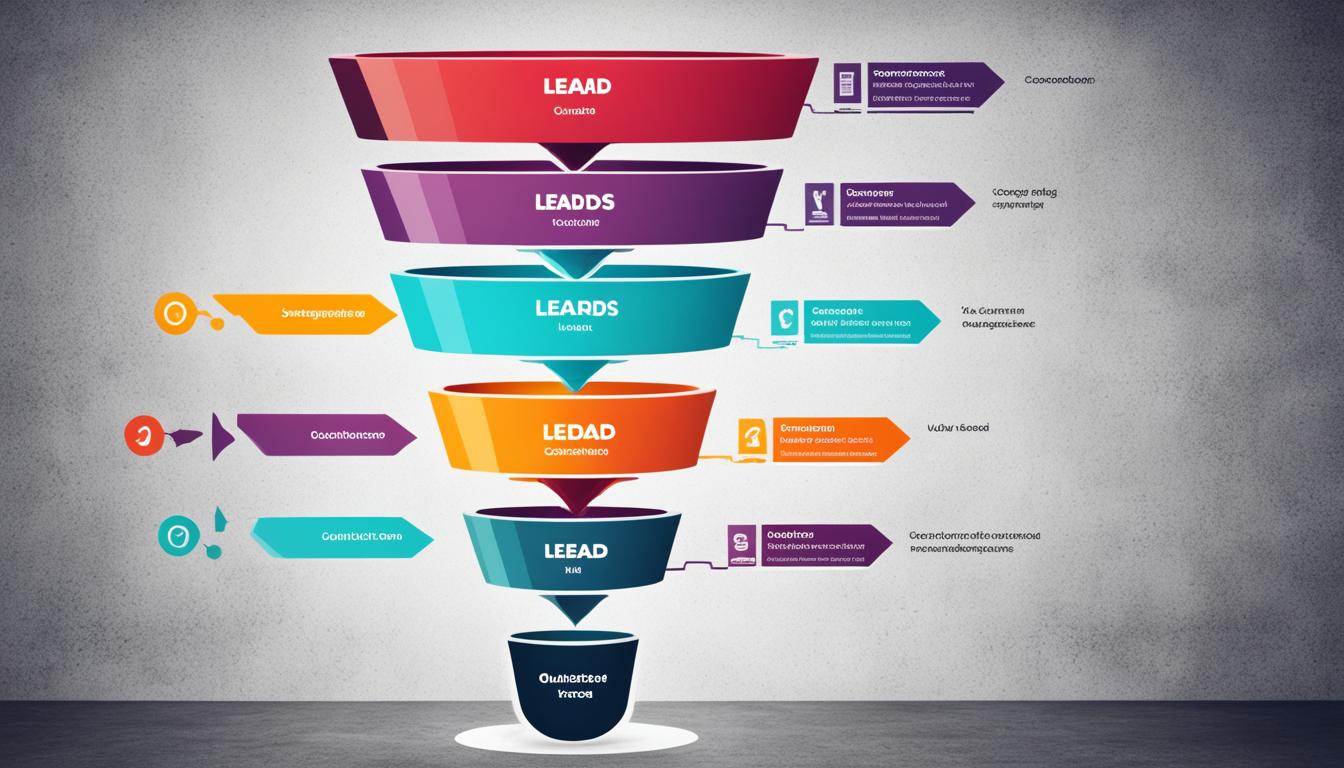A product marketing manager (PMM) is key in marketing, especially in tech. They communicate what’s great about a product through powerful messages. These messages meet the target audience just right. PMMs work with many teams. They gather insights, develop personas, research the market, create marketing materials, train sales staff, and outline the market entry strategy.
Good product marketing knows customer types, how to position products, and send strong messages. PMMs use tools and methods to make sure their product shines among rivals and launches well. They aim to get customers using the product and target new markets.
Becoming a PMM means great career opportunities in product and marketing. There’s no single way to become one. But, having top-notch marketing skills, business knowledge, and product passion helps. They work to make a product more successful, looking at scores like Net Promoter and marketing ROI.
This article will look at the PMM role, their teamwork with product management, what skills they need, and their goals. We’ll use examples to show how product marketing works and how it’s changing. If you’re thinking about a PMM career or want to understand their importance in marketing, this article has useful insights and examples.
Key Takeaways:
- Product marketing managers (PMMs) are responsible for effectively communicating a product’s value proposition to the market.
- PMMs collaborate with various teams to develop user and buyer personas, conduct market research, and create compelling marketing materials.
- The collaboration between product management and product marketing managers is crucial for the success of a product.
- Skills required for a PMM include effective communication, creativity, empathy, and qualitative and quantitative analysis.
- PMMs have goals related to improving product success, such as enhancing the Net Promoter Score and expanding into new target markets.
Responsibilities of a Product Marketing Manager
A product marketing manager (PMM) holds the key to a product’s success. They study the target audience, build marketing strategies, and make sure products launch well.
Developing User Personas
Creating user personas is a big job for a PMM. These personas are made-up but help understand real user needs and wants. With accurate personas, PMMs can better target their messaging.
Researching the Competitive Environment
PMMs need to know the competition well to stand out. They look at what others offer, how they price it, and how they market it. This knowledge helps PMMs make their products shine.
Collaborating with the Marketing Team
PMMs and the marketing team work together tightly. They craft messages, design visuals, and make content that clicks with buyers. This teamwork ensures the product’s benefits are clearly shown.
Training the Sales Team on Product Benefits
Training the sales team is a must for PMMs. They give salespeople the tools to explain why their product is best. This means offering materials and training that align with the marketing plan.
Developing the Go-to-Market Strategy
The go-to-market plan is drawn up by PMMs. It figures out how to introduce the product, set prices, work with teams, and get it to buyers. A solid plan makes the launch smooth.
Defining Goals and Metrics for Product Launches
PMMs set clear launch goals and ways to measure them. They aim for sales, new customers, and growing the market share. Having goals lets PMMs see what’s working and adjust as needed.
PMMs are crucial in making sure products meet the market right. They help the product speak to the customer, increase sales, and lead to success.
Collaboration between Product Management and Product Marketing Managers
Product managers and product marketing managers make a key team for product success. They work closely to share a vision and message that hits home with their audience. Product managers look after the strategy and find market chances. Product marketing managers focus on turning these strategies into messages that speak to people.
Working together, they play a big part in how a product is made. Product managers share what makes the product great. PMMs get to know the audience and craft messages that catch their eye. Together, they make sure the product’s value is clearly communicated and connects with customers.
This teamwork helps craft messages that really speak to the audience. When both sides see eye to eye, aligning product strategy with marketing becomes smoother. This team effort also improves cooperation across different teams. It brings a powerful approach to both making and marketing products.
By teaming up, product management and product marketing managers can successfully launch a product. Their teamwork ensures the message is right and strikes a chord with the audience. This critical partnership builds a shared vision, aligns product making efforts, and delivers a product the market wants.
| Benefits of Collaboration between Product Management and PMMs |
|---|
| 1. Shared Vision |
| 2. Effective Messaging |
| 3. Alignment of Product Development |
| 4. Customer-Centric Approach |
| 5. Cross-Functional Coordination |
How to Become a Product Marketing Manager
Starting a career as a product marketing manager doesn’t have a set path. People who love products, marketing, or managing them can easily shift into PMM roles. You need to know the market well and communicate clearly to be a good PMM.
You can boost your skills with online classes and certification programs. These programs teach you about market research, how to message well, and plan your market entry. You can learn at your own pace with online classes.
Also, getting a marketing degree or an MBA can really help. These degrees give you a strong grasp of marketing basics, strategic planning, and how to manage a business. These are key in product marketing.
Employers look for someone with varied skills, who works well with others, and understands business. If you’re skilled in marketing, managing products, and analyzing markets, you’ll stand out as a PMM candidate.
Key Steps to Building a Career as a Product Marketing Manager:
- Develop a strong interest in the product, marketing roles, or product management
- Focus on acquiring market understanding and effective communication skills
- Consider enrolling in online classes or certification programs for skill development
- Obtain a marketing degree or an MBA to enhance your qualifications
- Highlight diverse skills, collaboration abilities, and business savvy in job applications
Follow these steps and always aim to grow your knowledge and skills. Doing so will help you succeed as a product marketing manager.
| Marketing Career Options | Transition to PMM | Educational Advancements |
|---|---|---|
| Product Manager | Strong interest in product | Marketing degree or MBA |
| Market Research Analyst | Marketing roles experience | Online classes and certifications |
| Marketing Coordinator | Product management understanding | Continued professional development |
Product Marketing Manager Goals
Product marketing managers (PMMs) play a key role in a product’s success. They aim to improve the product’s market presence and performance. These efforts are based on key performance indicators (KPIs).
Here are the main goals of PMMs:
KPI Achievement:
PMMs focus on hitting targets like trial, growth, and revenue. They use these metrics to see how well the marketing works. This helps them know the impact on the product.
Improving Net Promoter Score:
The Net Promoter Score (NPS) shows how satisfied and loyal customers are. PMMs work to boost NPS. They do this by offering great value and meeting customer expectations.
ROI of Marketing Campaigns:
Maximizing marketing campaign returns is a goal. PMMs look at which tactics work best. They aim to spend wisely and increase revenue.
Refining Go-to-Market Tactics:
Choosing the right strategies for product launches is critical. PMMs tweak these plans to hit the target market just right. They use the best channels for their messages.
Sales Team Satisfaction:
PMMs check if the sales team has what they need. They provide training and tools for successful selling.
Shortening the Sales Cycle:
Speeding up sales is another goal. PMMs create messages that solve customer problems. They make the sales process quicker to boost revenue faster.
Reducing Customer Returns:
PMMs aim to lower returns by understanding what buyers want. They make sure the product matches customers’ expectations. This reduces dissatisfaction.
Expansion into New Markets:
Entering new markets is important. PMMs research and find new customers. They customize their marketing to these new segments to grow revenue.
PMMs also want to increase market knowledge and lead in their industry. All these goals together make a product successful in the market.
| Goal | Description |
|---|---|
| KPI Achievement | Meeting or surpassing key performance indicators related to trial, growth, adoption, revenue, and churn. |
| Improving Net Promoter Score | Enhancing customer loyalty and satisfaction by improving the Net Promoter Score through exceptional value propositions and meeting customer expectations. |
| ROI of Marketing Campaigns | Maximizing return on investment by optimizing marketing campaigns and channel allocation to drive higher revenue generation. |
| Refining Go-to-Market Tactics | Continuously improving go-to-market strategies and messaging to effectively reach the target audience and drive successful product launches. |
| Sales Team Satisfaction | Ensuring sales teams have the necessary training, collateral, and tools to effectively sell the product, leading to increased satisfaction and better sales performance. |
| Shortening the Sales Cycle | Streamlining the sales process, addressing buyer pain points, and delivering compelling messaging to accelerate the sales cycle and drive faster revenue generation. |
| Reducing Customer Returns | Minimizing customer returns by identifying and addressing product-related issues, improving positioning, and meeting buyer expectations. |
| Expansion into New Markets | Identifying new target markets, conducting market research, and tailoring marketing strategies to maximize product adoption and revenue growth in new segments. |
Skills Every Product Marketing Manager Should Have
Product marketing managers are key to a product’s success. To be great, they need many important skills. Let’s look at the skills they must have:
Effective Communication
Good communication skills are a must. These managers should clearly explain the product’s benefits to teams and customers. This makes sure the product’s message gets across, leading to better sales.
Storytelling
They need to be good at storytelling. This lets them build engaging stories about the product. By knowing what customers want, they can make tales that draw people in. This skill helps the product stand out in a busy market.
Creativity
Creativity helps them think of new marketing ideas. With creative thinking, they can grab the audience’s attention. This skill lets them show why their product is different and better.
Stakeholder Management
They work with different teams like product management and sales. Being good at managing these relationships is key. This ensures all teams work together well for the product’s marketing.
Empathy
Understanding the audience’s needs is crucial. Empathy lets them see from the customer’s perspective. They can then create messages and campaigns that truly speak to the audience.
Qualitative and Quantitative Analysis
They mix both types of analysis in their work. Qualitative analysis helps understand customer needs and the market. Quantitative analysis checks if marketing is working and guides strategy with solid data.
With these skills, product marketing managers can show the value of products, make strong campaigns, work well with teams, and meet audience needs. These abilities are essential for launching products successfully.
The Evolution of Product Marketing
Product marketing is key in launching products. It tells the product’s story, shapes its messaging, and highlights its unique value. This field has grown to meet new customer needs and market changes.
At its heart, product marketing is about knowing what customers want and creating messages that speak to them. Market analysis and customer insights help product marketing managers (PMMs) position products well. They find ways to stand out from competitors.
The role of product marketing has broadened. It now includes branding and strategy planning. Product marketers shape the customer journey. They ensure every contact with the brand is consistent and positive.
Branding is crucial in product marketing. It creates the identity and reputation of a product. PMMs work hard to build and keep a strong brand image. This helps the product stand out.
The unique value proposition (UVP) is central to product marketing. It shows what makes a product special or better than others. A well-made UVP clearly shows the product’s value to customers.
The customer journey has become more important in product marketing. PMMs understand the steps customers take from discovery to purchase and beyond. By mapping out this journey, they find ways to engage and please customers at every step. This makes the experience smooth and enjoyable.
Evolution of Product Marketing
| Evolutionary Aspect | Description |
|---|---|
| Messaging | Crafting compelling messages that resonate with the target audience |
| Branding | Developing and maintaining a strong brand image |
| Unique Value Proposition | Defining what makes a product different or better than others |
| Customer Journey | Understanding and optimizing the stages customers go through |
Product marketing’s evolution shows how markets and customer focus have changed. PMMs lead in meeting customer needs, creating engaging messages, and building memorable brand experiences. By embracing change and adapting, they drive product success in the market.
The Product Marketing Framework
The Product Marketing Framework is a detailed guide for successful product marketing. It’s made up of five main stages: discover, strategize, define, get set, and grow. Each phase is key in leading a product through its journey to success.
1. Discover
In the discover phase, the goal is to learn all about the market, customer needs, and what the competition is doing. This involves doing market research and spotting industry trends. Understanding these aspects helps figure out how to make a product stand out.
2. Strategize
The strategize phase is about finding the perfect fit between the product and the market. It’s time to work with other teams to set goals, understand who the product is for, and what makes it special. It’s also the stage where teams figure out how to differ from competitors.
3. Define
Defining means getting to know your users very well. This includes making user personas and understanding the customer journey. The focus is on meeting the customer’s needs and preferences to make marketing more effective. This ensures marketing efforts really connect with the audience.
4. Get Set
Getting set is all about prepping for a big product launch. Marketing works with sales and others to create materials and plans. This phase makes sure everyone can share the product’s benefits clearly with potential users.
5. Grow
The grow phase is about making the product better over time. It involves keeping an eye on how the product is doing and finding ways to make it even better. Marketers need to be ready to change strategies to keep up with customer needs and stay ahead of competitors.
Product Marketing vs. Product Management
In the world of launching products, product marketing and management are often mixed up. Yet, they have clear, different roles that are key to a product’s success. Both roles help in launching products well and need to work with other teams. But they focus on different areas of the process.
Product managers handle the product’s big picture plans. They look out for market chances, study market trends, and talk to customers. They work with teams to plan the product’s future. Product managers choose main features and make sure the product meets customer needs.
Product marketing managers, however, are all about how the product is seen by others. They create important messages and talk directly to customers. They make marketing resources like guides and stories. Product marketing managers work with other teams to share the product’s benefits. They aim to solve the customer’s problems and connect with them.
To show how these jobs are different:
| Product Management | Product Marketing |
|---|---|
| Analyze market trends and identify opportunities | Position the product and craft compelling messaging |
| Define the product’s roadmap and prioritize features | Develop marketing materials and sales collateral |
| Collaborate with cross-functional teams | Communicate with customers and address their pain points |
Working together, product management and marketing are key to developing and selling products well. Their combined skills help meet product goals and message correctly. This teamwork makes the product launch better and helps customers have a good experience.
Launching products needs both strategy and understanding the market. Product managers make sure the product fits the market. Product marketing managers craft messages that matter to customers. The teamwork between these roles is critical for launching products right and winning in the market.
Examples of Product Marketing
Product marketing includes a variety of examples. They show how to use unique value propositions, messaging, and market research effectively. When product marketers craft messages that show off a product’s unique features, they connect well with their audience. This helps to get more customers interested.
The iPhone launch by Apple is a great example of product marketing. Apple’s key advantage is making everything work together smoothly. It offers users a simple and integrated experience. The iPhone is promoted for its new features, sleek look, and top performance. It’s aimed at people who love technology.
Nike heavily relies on market research for its product marketing. They use surveys and focus groups to learn what people want. This helps Nike understand current trends and who they are selling to. Using this info, they create products that their customers really want.
Coca-Cola uses competitive analysis to see how they stack up against rivals like Pepsi. They look at pricing, how products are packaged, and how they are promoted. This helps Coca-Cola find ways to stand out. They use this info to improve their marketing. This keeps them leading in the competitive drink industry.
Examples of Product Marketing
| Company | Product | Unique Value Proposition | Messaging |
|---|---|---|---|
| Apple | iPhone | Seamless integration of hardware, software, and services | Innovative features, sleek design, superior performance |
| Nike | Athletic Shoes | Premium quality, cutting-edge design | Empowering athletes, superior performance, iconic style |
| Coca-Cola | Beverages | Refreshing, iconic brand | Open happiness, share a Coke |
Conclusion
Product marketing managers are key for a product’s success. They communicate its worth, shape the message, and drive customer usage. By working with sales and marketing teams, they tell the product’s story well. This turns the product’s value into strong messages that appeal to customers.
These managers have vital skills like speaking well, being creative, and understanding others. They know how to manage relationships and analyze data. This means they can bridge the gap between the product and the people who might want to use it. Their work ensures the product is launched successfully.
There are many chances for growth in product marketing. People who want to grow can use their skills and knowledge. They help get customers and place the product strongly against competitors. This makes them vital in making the business successful.






